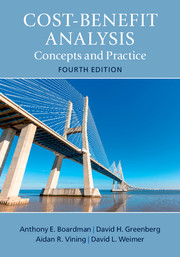Chapter 8 - Option Price and Option Value
from PART II - FUNDAMENTALS OF CBA
Summary
In the actual practice of CBA in circumstances involving significant risks, analysts almost always apply the Kaldor-Hicks criterion to expected net benefits. They typically estimate changes in social surplus conditional on particular contingencies occurring, and then they compute an expected value over the contingencies as demonstrated in Chapter 7. Economists, however, now generally consider option price, the amount that individuals are willing to pay for policies prior to the realization of contingencies, to be the theoretically correct measure of willingness to pay in circumstances of uncertainty. Whereas social surplus can be thought of as an ex post measure of welfare change in the sense that individuals value policies as if contingencies have already occurred, option price is an ex ante welfare measure in the sense that consumers value policies without knowing which contingency will actually occur. These measures generally differ from one another. In this chapter, we consider the implications of the common use of expected social surplus, rather than option price, as the method for measuring benefits.
The central concern of this chapter is the conceptually correct measure of willingness to pay in circumstances in which individuals face uncertainty. Individuals may face uncertainties about their demand for a good, the supply of a good, or both. With respect to demand, one may be uncertain about one's future income, utility function (tastes), and the prices of other goods. For example, one's utility from skiing may depend on the sturdiness of one's knees, a physical condition that cannot be predicted with certainty. With respect to supply, one may be uncertain about the future quantity, quality, or price of a good. For example, the increase in the quality of fishing that will result from restocking a lake with game fish depends on such circumstances as weather and spills of toxic chemicals, and thus is uncertain to some degree.
In contrast to Chapter 7, we limit our attention to uncertainties of direct relevance to individuals. We ignore uncertainties that are not of direct individual relevance, but instead arise because analysts must make predictions about the future to estimate measures of WTP.
- Type
- Chapter
- Information
- Cost-Benefit Analysis , pp. 202 - 223Publisher: Cambridge University PressPrint publication year: 2017



